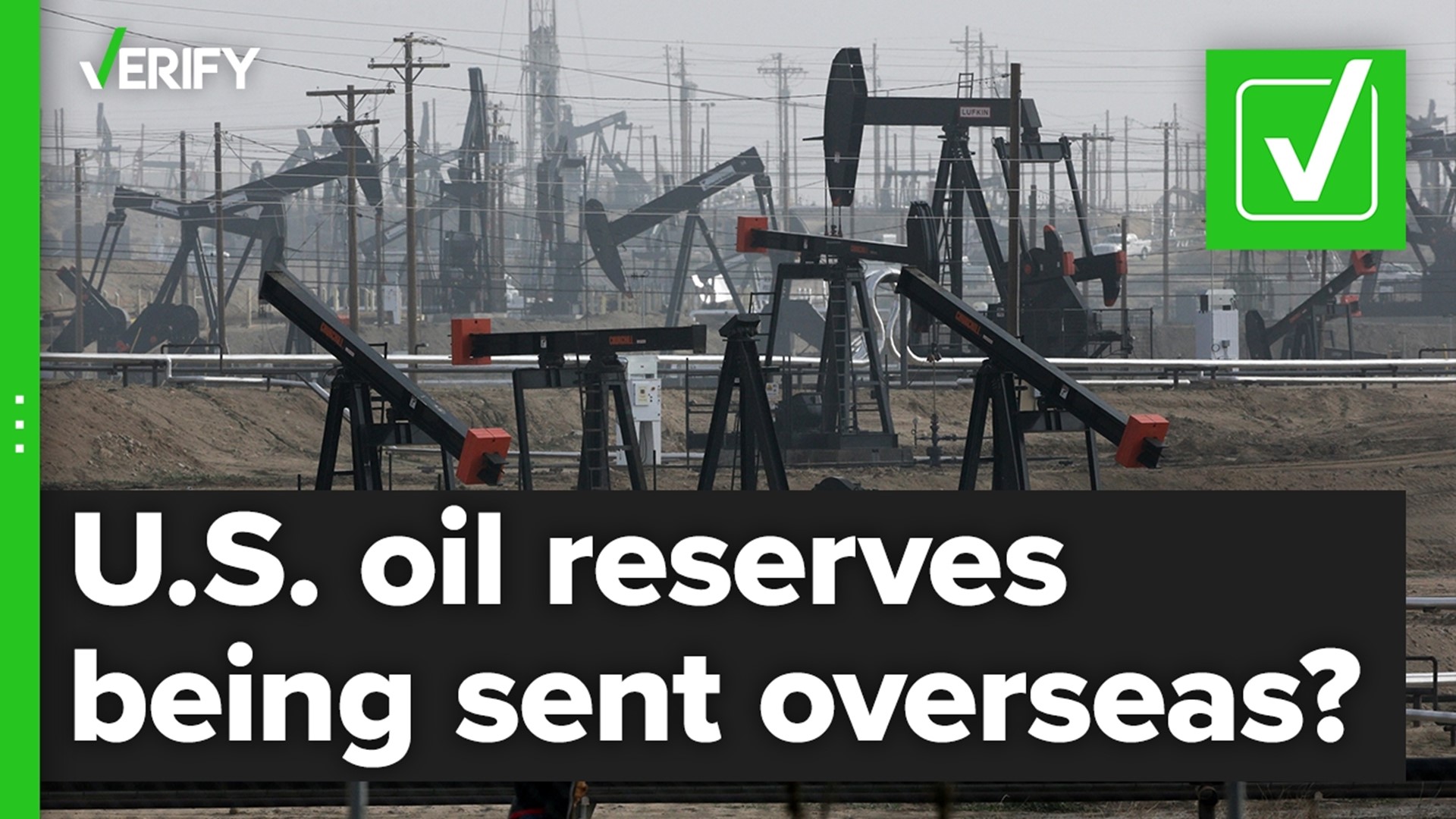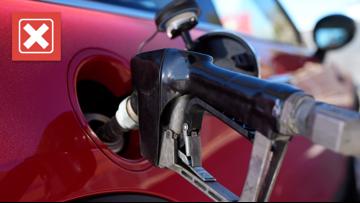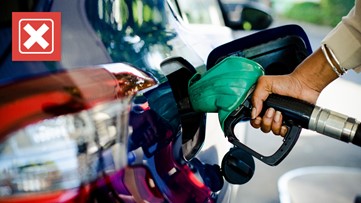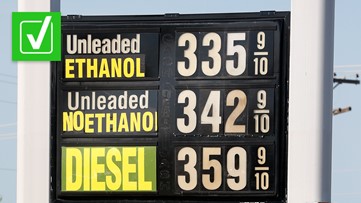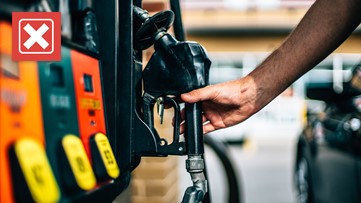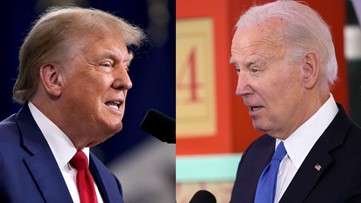President Joe Biden’s administration has recently faced criticism from some U.S. lawmakers for allegedly selling oil from the nation’s emergency reserves to foreign countries, including China.
"While Americans are paying record gasoline and diesel fuel prices, the Biden administration appears to have been letting our strategic oil stockpiles flow to foreign countries and entities," Sen. Josh Hawley (R-Mo.) wrote in a letter to Department of Energy Inspector General Teri Donaldson. "Critically, the American people deserve answers as to how exactly the Department justified sending oil from the SPR to China. DOE’s recent transfer of nearly one million barrels of oil to UNIPEC is just one concerning example."
Hawley and others have cited a news report from Reuters published on July 6 that said more than 5 million barrels of oil from U.S. reserves were exported to Asia and Europe in June.
Dozens of VERIFY readers have asked whether it’s true that millions of barrels of oil from U.S. reserves were sent overseas.
THE QUESTION
Has oil from U.S. reserves been sent to countries overseas?
THE SOURCES
- The U.S. Department of Energy
- Patrick De Haan, head of petroleum analysis for GasBuddy
- Ed Hirs, University of Houston Energy Fellow
- Hugh Daigle, Ph.D., associate professor at the University of Texas at Austin’s Hildebrand Department of Petroleum and Geosystems Engineering
THE ANSWER
Yes, oil from U.S. reserves has been sent to countries overseas. Foreign companies can bid on oil from the Strategic Petroleum Reserve (SPR) that’s sold in a competitive auction.
WHAT WE FOUND
The U.S. Strategic Petroleum Reserve (SPR) is the world’s largest supply of emergency crude oil, with stocks stored in underground salt caverns at four sites located in Louisiana and Texas. The president can decide to sell oil from the reserves in accordance with conditions outlined by federal law, according to the U.S. Department of Energy (DOE).
If the president approves a public sale of crude oil from the SPR, it will be sold to the highest bidders in a competitive auction. Companies that bid on oil from the reserves are often based in the U.S., though those based in other countries can bid, too.
Domestic companies can also export oil to buyers in other countries, University of Houston Energy Fellow Ed Hirs told VERIFY.
“It’s kind of like an eBay auction for oil,” Patrick De Haan, head of petroleum analysis for GasBuddy, said.
According to the DOE, the money from these sales is then placed into account and later used to purchase crude oil that will go back into the SPR.
Kpler, a trade analytics firm, estimated that 5.35 million barrels of oil sold from the SPR in June 2022 were shipped overseas, according to Hugh Daigle, associate professor at University of Texas at Austin’s Hildebrand Department of Petroleum and Geosystems Engineering.
“As with oil and gas producers, the federal government seeks to obtain the best price for SPR crude, and sometimes this involves sales to foreign companies. High commodity prices at home reflect high commodity prices globally,” Haigle told VERIFY. “Because of this global market, you could think about shipments of SPR oil abroad taking the place of other domestic oil being shipped abroad: if the SPR oil were forced to stay in the U.S., then the overseas demand would simply be met by a different producer willing to ship their oil overseas.”
Daigle also explained how the SPR auction and bidding process works.
First, when the U.S. government determines it will make a sale from the SPR, the DOE posts a notice inviting companies to bid on specific quantities of oil. The companies have to be registered with the Crude Oil Sales Program.
The U.S. government then accepts the highest bids and publicly announces the companies that have won sales.
“There is no restriction that registered companies be based in the United States, and many times foreign companies will submit bids through U.S. subsidiaries. There are no laws prohibiting this,” Daigle told VERIFY in an email.
The DOE most recently announced contracts awarded for the purchase of crude oil from the SPR on July 11.
Nearly 1 million barrels of oil from the most recent sale, which was announced on June 14, went to Unipec America, Inc. Unipec is a Houston-based subsidiary of Sinopec, an oil company owned by the Chinese government.
Equinor Marketing & Trading, which received 3.65 million barrels of oil in the most recent sale, is a Norwegian company, Daigle said. The company could ship the oil to Norway, though they may decide to keep it in the U.S., he added.
“Oil is a commodity traded on the global market, and while we can’t explain the decisions of the selected bidders nor control oil and gas companies, the commodity the industry sells or the market, the Strategic Petroleum Reserve remains a critical energy security tool to address global crude oil supply disruptions,” a spokesperson for the DOE wrote in an email to VERIFY.
Some critics have said the export of oil from U.S. reserves to foreign countries will continue to drive up gas prices at home. But experts told VERIFY that isn’t true.
“Absolutely not,” Hirs said.
When oil is released from the SPR, that means there is greater supply available on the global market, which “helps to restrain prices,” according to De Haan.
“[The SPR] supplies oil to a country that needs it, so it doesn’t really matter where it goes. It does not negatively impact prices at home,” he said.
The U.S used to have a ban on exporting crude oil worldwide, but in 2015 Congress lifted that ban after U.S. crude oil production nearly doubled from 2009 to 2015.
Since the ban was lifted, Presidents Obama, Trump and Biden have all sold crude oil from the SPR to the global market.
VERIFY digital journalist Erin Jones and researcher Mauricio Chamberlin contributed to this report.
